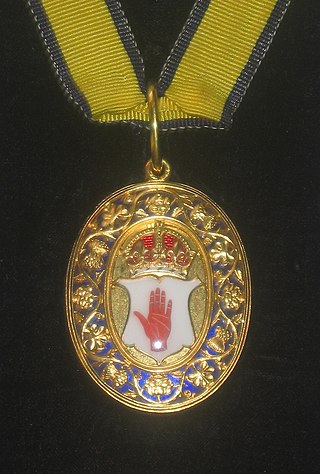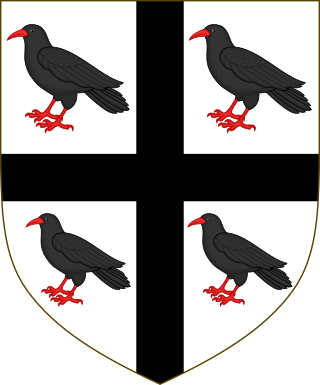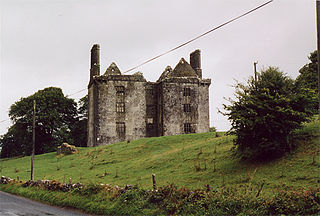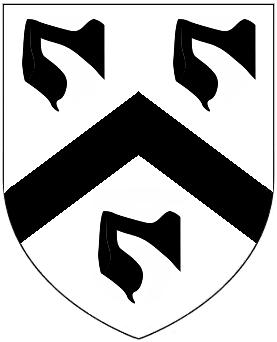
A baronet or the female equivalent, a baronetess, is the holder of a baronetcy, a hereditary title awarded by the British Crown. The title of baronet is mentioned as early as the 14th century; however, in its current usage it was created by James I of England in 1611 as a means of raising funds for the crown.

Viscount Gage, of Castle Island in the County of Kerry of the Kingdom of Ireland, is a title in the Peerage of Ireland. It was created in 1720 for Thomas Gage, along with the subsidiary title of Baron Gage, of Castlebar in the County of Mayo, also in the Peerage of Ireland. In 1744 he also succeeded his cousin as eighth Baronet, of Firle Place. The titles remain united. The Gage family descends from John Gage, who was created a baronet, of Firle Place in the County of Sussex, in the Baronetage of England on 26 March 1622. His great-grandson, the seventh Baronet, represented Seaford in Parliament. He was succeeded by his first cousin, Thomas Gage, 1st Viscount Gage, the eighth Baronet. He sat as a Member of Parliament for Minehead and Tewkesbury and also served as Governor of Barbados. In 1720, 24 years before succeeding in the baronetcy, he was raised to the Peerage of Ireland as Baron Gage and Viscount Gage. His second son was the military commander the Hon. Thomas Gage.
There have been ten baronetcies created for persons with the surname Browne, six in the Baronetage of Great Britain, three in the Baronetage of Ireland and one in the Baronetage of Nova Scotia. Only one creation is extant as of 2010. Three of the creations were for members of the Browne family headed by the Viscount Montagu.

There have been two baronetcies created for persons with the surname Aylmer, both in the Baronetage of Ireland. Both titles are extant.

There have been two baronetcies created for persons with the surname Burke, both in the Baronetage of Ireland. As of 2014 one creation is extant.
There have been five baronetcies created for persons with the surname Hill, one in the Baronetage of Nova Scotia, one in the Baronetage of Great Britain, one in the Baronetage of Ireland and two in the Baronetage of the United Kingdom. Three of the creations are extant as of 2008.
There have been six baronetcies created for persons with the surname Newton, three in the Baronetage of England, one in the Baronetage of Nova Scotia and two in the Baronetage of the United Kingdom.
There have been three baronetcies created for persons with the surname O'Neill, two in the Baronetage of Ireland and one in the Baronetage of the United Kingdom.
There have been three baronetcies created for persons with the surname Everard, one in the Baronetage of Ireland, one in the Baronetage of England and one in the Baronetage of the United Kingdom. Only one creation is extant as of 2010.
There have been four baronetcies created for persons with the surname Temple, two in the Baronetage of England, one in the Baronetage of Nova Scotia and one in the Baronetage of the United Kingdom.

The Lynch Baronetcy of Galway – which later became Lynch-Blosse Baronetcy – is a title in the Baronetage of Ireland. It was created on 8 June 1622 for Henry Lynch, a member of an Anglo-Norman family and one of the merchant Tribes of Galway. Both he and the second Baronet represented County Galway in the Irish House of Commons. The third Baronet was a Baron of the Court of Exchequer (Ireland). Forced to flee to France after the Glorious Revolution, his eldest son succeeded to the title and estates. The family seat was Athavallie House, Castlebar, County Mayo. The sixth Baronet assumed the additional surname of Blosse, having married Elizabeth, daughter and heir of Francis Barker, heir of Tobias Blosse. The seventh Baronet also served in the Irish House of Commons representing Tuam.
There have been four baronetcies created for persons with the surname Musgrave, one in the Baronetage of England, one in the Baronetage of Nova Scotia, one in the Baronetage of Ireland and one in the Baronetage of the United Kingdom. As of 2014 two of the creations are extant.
There have been two baronetcies created for persons with the surname Piers, one in the Baronetage of Nova Scotia, now extinct, and one in the Baronetage of Ireland, extant as of 2018.

There have been three baronetcies, all in the Baronetage of England, created for members of the Mansel family, which played a major role in the early re-settlement of the Gower Peninsula, in Glamorgan, Wales. Only one creation is extant as of 2008.

There have been three baronetcies created for persons with the surname Carew, two in the Baronetage of England prior to 1707, one in the Baronetage of Great Britain.

There have been five baronetcies created for persons with the surname Kennedy, one in the Baronetage of Ireland, three in the Baronetage of Nova Scotia and one in the Baronetage of the United Kingdom. One creation is extant as of 2010.
Sir Kildare Borrowes, 3rd Baronet was an Irish politician.
There are four extinct baronetcies created for persons with the surname Norton: two in the Baronetage of England, one in the Baronetage of Ireland and one in the Baronetage of Nova Scotia.
There have been two baronetcies created for persons with the surname Talbot, both in the Baronetage of Ireland. One creation was forfeited while the other is extinct.

The FitzGerald baronetcy, of Geraldine Place in St Finn Barr in the County of Cork, was created in the Baronetage of the United Kingdom on 10 October 1903 for Edward FitzGerald, Lord Mayor of Cork in 1901, 1902 and 1903.









